高中英语语法复习学案教师版——冠词
- 格式:doc
- 大小:69.50 KB
- 文档页数:5
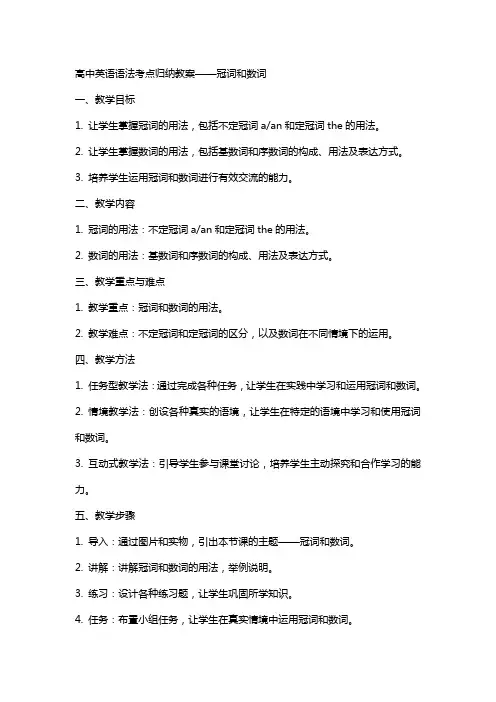
高中英语语法考点归纳教案——冠词和数词一、教学目标1. 让学生掌握冠词的用法,包括不定冠词a/an和定冠词the的用法。
2. 让学生掌握数词的用法,包括基数词和序数词的构成、用法及表达方式。
3. 培养学生运用冠词和数词进行有效交流的能力。
二、教学内容1. 冠词的用法:不定冠词a/an和定冠词the的用法。
2. 数词的用法:基数词和序数词的构成、用法及表达方式。
三、教学重点与难点1. 教学重点:冠词和数词的用法。
2. 教学难点:不定冠词和定冠词的区分,以及数词在不同情境下的运用。
四、教学方法1. 任务型教学法:通过完成各种任务,让学生在实践中学习和运用冠词和数词。
2. 情境教学法:创设各种真实的语境,让学生在特定的语境中学习和使用冠词和数词。
3. 互动式教学法:引导学生参与课堂讨论,培养学生主动探究和合作学习的能力。
五、教学步骤1. 导入:通过图片和实物,引出本节课的主题——冠词和数词。
2. 讲解:讲解冠词和数词的用法,举例说明。
3. 练习:设计各种练习题,让学生巩固所学知识。
4. 任务:布置小组任务,让学生在真实情境中运用冠词和数词。
5. 展示:让学生展示自己的任务成果,互相评价和交流。
6. 总结:对本节课的内容进行总结,强调冠词和数词的重要性和用法。
7. 作业:布置课后作业,巩固所学知识。
六、教学评估1. 课堂观察:观察学生在课堂上的参与程度、任务完成情况和语言运用能力。
2. 练习答案:收集学生的练习答案,评估他们对冠词和数词用法的掌握程度。
3. 小组评价:让学生互相评价小组任务成果,促进学生之间的交流和合作。
七、扩展活动1. 制作海报:让学生分组制作有关冠词和数词的海报,展示他们的学习成果。
2. 角色扮演:设计一个场景,让学生运用所学冠词和数词进行角色扮演。
3. 写作练习:布置一篇小作文,让学生运用冠词和数词描述一幅图画或讲述一个故事。
八、教学反思1. 反思教学内容:思考本节课所教授的内容是否全面、清晰,学生是否能够理解和掌握。
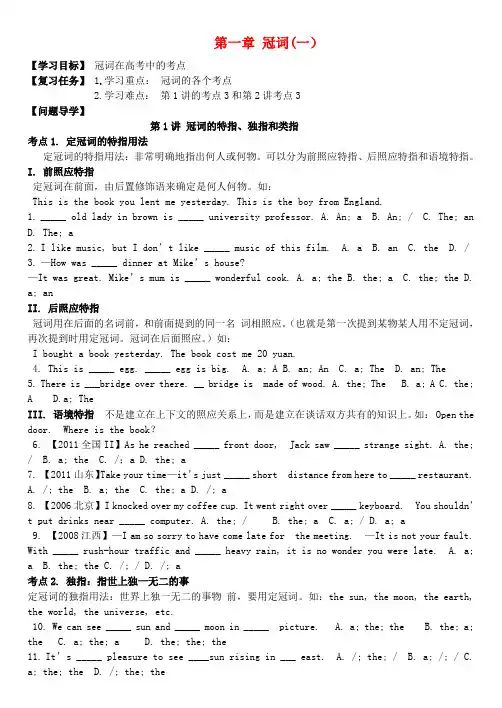
第一章冠词(一)【学习目标】冠词在高考中的考点【复习任务】1.学习重点:冠词的各个考点2.学习难点:第1讲的考点3和第2讲考点3【问题导学】第1讲冠词的特指、独指和类指考点1. 定冠词的特指用法定冠词的特指用法:非常明确地指出何人或何物。
可以分为前照应特指、后照应特指和语境特指。
I. 前照应特指定冠词在前面,由后置修饰语来确定是何人何物。
如:This is the book you lent me yesterday. This is the boy from England.1._____ old lady in brown is _____ university professor. A. An; a B. An; / C. The; anD. The; a2.I like music, but I don’t like _____ music of this film. A. a B. an C. the D. /3.—How was _____ dinner at Mike’s house?—It was great. Mike’s mum is _____ wonderful cook. A. a; the B. the; a C. the; the D. a; anII. 后照应特指冠词用在后面的名词前,和前面提到的同一名词相照应。
(也就是第一次提到某物某人用不定冠词,再次提到时用定冠词。
冠词在后面照应。
)如:I bought a book yesterday. The book cost me 20 yuan.4. This is _____ egg. _____ egg is big. A. a; A B. an; An C. a; The D. an; The5.There is ___bridge over there. __ bridge is made of wood. A. the; The B. a; A C. the;A D.a; TheIII. 语境特指不是建立在上下文的照应关系上,而是建立在谈话双方共有的知识上。
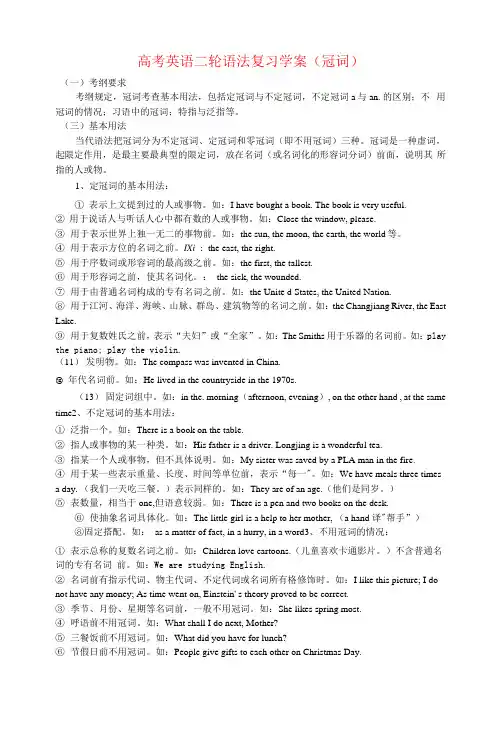
高考英语二轮语法复习学案(冠词)(一)考纲要求考纲规定,冠词考查基本用法,包括定冠词与不定冠词,不定冠词a与an.的区别;不用冠词的情况;习语中的冠词;特指与泛指等。
(三)基本用法当代语法把冠词分为不定冠词、定冠词和零冠词(即不用冠词)三种。
冠词是一种虚词,起限定作用,是最主要最典型的限定词,放在名词(或名词化的形容词分词)前面,说明其所指的人或物。
1、定冠词的基本用法:① 表示上文提到过的人或事物。
如:I have bought a book. The book is very useful.② 用于说话人与听话人心中都有数的人或事物。
如:Close the window, please.③用于表示世界上独一无二的事物前。
如:the sun, the moon, the earth, the world等。
④用于表示方位的名词之前。
IXi: the east, the right.⑤用于序数词或形容词的最高级之前。
如:the first, the tallest.⑥用于形容词之前,使其名词化。
:the sick, the wounded.⑦用于由普通名词构成的专有名词之前。
如:the Unite d States, the United Nation.⑧用于江河、海洋、海峡、山脉、群岛、建筑物等的名词之前。
如:the Changjiang River, the East Lake.⑨用于复数姓氏之前,表示“夫妇”或“全家”。
如:The Smiths用于乐器的名词前。
如:play the piano; play the violin.(11)发明物。
如:The compass was invented in China.⑫年代名词前。
如:He lived in the countryside in the 1970s.(13)固定词组中。
如:in the. morning(afternoon, evening), on the other hand , at the same time2、不定冠词的基本用法:①泛指一个。
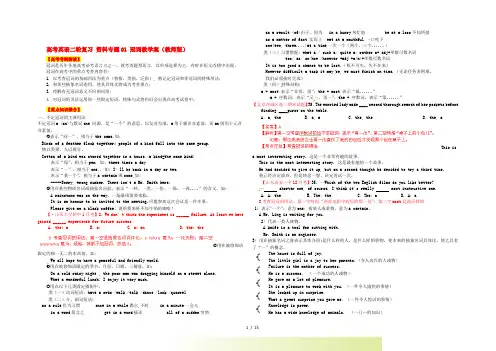
高考英语二轮复习资料专题01 冠词教学案(教师版)【高考考纲解读】冠词是历年各地高考必考语言点之一。
就考查题型而言,以单项选择为主,有时在短文改错中出现。
冠词在高考中的重点考查内容有:1. 以考查冠词的基础用法为重点(特指,类指,泛指), 熟记定冠词和零冠词的特殊用法;2. 和某些抽象名词连用,使其具体化将成为考查重点;3. 理解有无冠词意义不同的词组;4. 对冠词的灵活运用即一些固定短语,特殊句式将仍旧会出现在高考试卷中。
【重点知识整合】一、不定冠词的主要用法不定冠词a (an)与数词one 同源,是“一个”的意思。
以发音为准,a用于辅音音素前,而an则用于元音音素前。
◆表示“同一”,相当于the same.如:Birds of a feather flock together; people of a kind fall into the same group.物以类聚,人以群分。
Cotton of a kind was stored together in a house.(a kind=the same kind)表示“每”,相当于per. 如:three times a day表示“一”,相当于one.. 如:I’ll be back in a day or two.表示“某一个”,相当于a certain或some,如:-----Sorry, wrong number. There isn't a Mr. Smith here.❖用在某些物质名词或抽象名词前,表示“一种、一类、一份、一场、一阵....”的含义,如:A rainstorm was on the way. 一场暴雨就要来临。
It is an honour to be invited to the meeting.应邀参加这次会议是一件幸事。
Please give me a black coffee! 请给我来杯不加牛奶的咖啡!【·山西大学附中1月考】2. We don’t think the experiment is ______ failure. At least we have gained ______ experience for future success.A. the; aB. a; /C. a; anD. the; the♦用在被修饰语限定的独一无二的东西前,如:We all hope to have a peaceful and friendly world.⌧用在被修饰语限定的季节,月份,日期,三餐前,如:On a cold rainy night , the poor man was dragging himself on a street alone.What a wonderful lunch! I enjoy it very much.⍓用在以下几类固定搭配中。
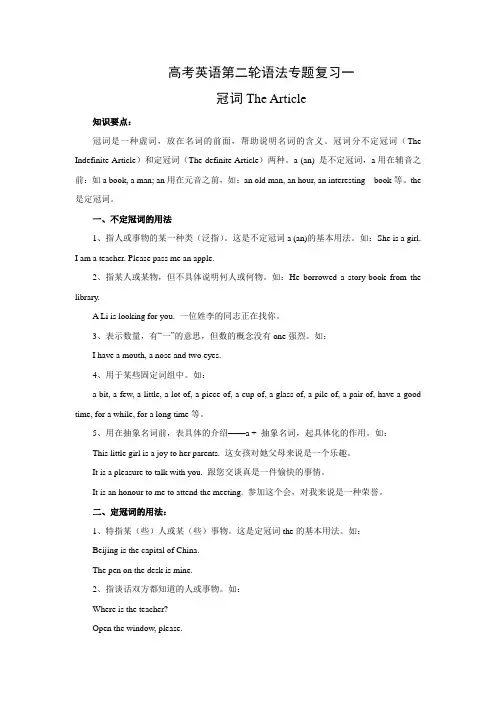
高考英语第二轮语法专题复习一冠词The Article知识要点:冠词是一种虚词,放在名词的前面,帮助说明名词的含义。
冠词分不定冠词(The Indefinite Article)和定冠词(The definite Article)两种。
a (an) 是不定冠词,a用在辅音之前:如a book, a man; an用在元音之前,如:an old man, an hour, an interesting book等。
the 是定冠词。
一、不定冠词的用法1、指人或事物的某一种类(泛指)。
这是不定冠词a (an)的基本用法。
如:She is a girl.I am a teacher. Please pass me an apple.2、指某人或某物,但不具体说明何人或何物。
如:He borrowed a story-book from the library.A Li is looking for you. 一位姓李的同志正在找你。
3、表示数量,有“一”的意思,但数的概念没有one强烈。
如:I have a mouth, a nose and two eyes.4、用于某些固定词组中。
如:a bit, a few, a little, a lot of, a piece of, a cup of, a glass of, a pile of, a pair of, have a good time, for a while, for a long time等。
5、用在抽象名词前,表具体的介绍——a + 抽象名词,起具体化的作用。
如:This little girl is a joy to her parents. 这女孩对她父母来说是一个乐趣。
It is a pleasure to talk with you. 跟您交谈真是一件愉快的事情。
It is an honour to me to attend the meeting. 参加这个会,对我来说是一种荣誉。
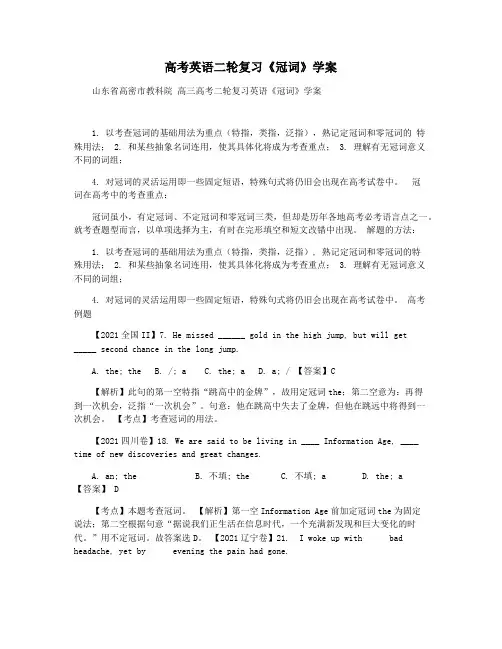
高考英语二轮复习《冠词》学案山东省高密市教科院高三高考二轮复习英语《冠词》学案1. 以考查冠词的基础用法为重点(特指,类指,泛指),熟记定冠词和零冠词的特殊用法; 2. 和某些抽象名词连用,使其具体化将成为考查重点; 3. 理解有无冠词意义不同的词组;4. 对冠词的灵活运用即一些固定短语,特殊句式将仍旧会出现在高考试卷中。
冠词在高考中的考查重点:冠词虽小,有定冠词、不定冠词和零冠词三类,但却是历年各地高考必考语言点之一。
就考查题型而言,以单项选择为主,有时在完形填空和短文改错中出现。
解题的方法:1. 以考查冠词的基础用法为重点(特指,类指,泛指), 熟记定冠词和零冠词的特殊用法; 2. 和某些抽象名词连用,使其具体化将成为考查重点; 3. 理解有无冠词意义不同的词组;4. 对冠词的灵活运用即一些固定短语,特殊句式将仍旧会出现在高考试卷中。
高考例题【2021全国II】7. He missed ______ gold in the high jump, but will get_____ second chance in the long jump.A. the; theB. /; aC. the; aD. a; / 【答案】C【解析】此句的第一空特指“跳高中的金牌”,故用定冠词the;第二空意为:再得到一次机会,泛指“一次机会”。
句意:他在跳高中失去了金牌,但他在跳远中将得到一次机会。
【考点】考查冠词的用法。
【2021四川卷】18. We are said to be living in ____ Information Age, ____ time of new discoveries and great changes.A. an; theB. 不填; theC. 不填; aD. the; a【答案】 D【考点】本题考查冠词。
【解析】第一空Information Age前加定冠词the为固定说法;第二空根据句意“据说我们正生活在信息时代,一个充满新发现和巨大变化的时代。
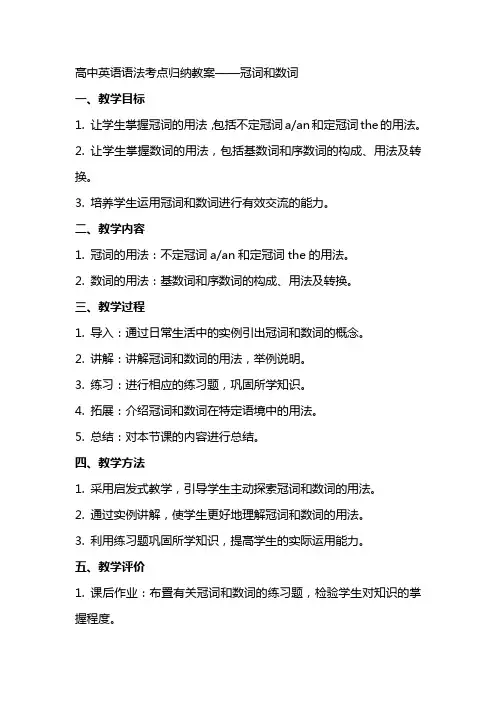
高中英语语法考点归纳教案——冠词和数词一、教学目标1. 让学生掌握冠词的用法,包括不定冠词a/an和定冠词the的用法。
2. 让学生掌握数词的用法,包括基数词和序数词的构成、用法及转换。
3. 培养学生运用冠词和数词进行有效交流的能力。
二、教学内容1. 冠词的用法:不定冠词a/an和定冠词the的用法。
2. 数词的用法:基数词和序数词的构成、用法及转换。
三、教学过程1. 导入:通过日常生活中的实例引出冠词和数词的概念。
2. 讲解:讲解冠词和数词的用法,举例说明。
3. 练习:进行相应的练习题,巩固所学知识。
4. 拓展:介绍冠词和数词在特定语境中的用法。
5. 总结:对本节课的内容进行总结。
四、教学方法1. 采用启发式教学,引导学生主动探索冠词和数词的用法。
2. 通过实例讲解,使学生更好地理解冠词和数词的用法。
3. 利用练习题巩固所学知识,提高学生的实际运用能力。
五、教学评价1. 课后作业:布置有关冠词和数词的练习题,检验学生对知识的掌握程度。
2. 课堂表现:观察学生在课堂上的参与程度、提问回答等情况,了解学生的学习状态。
3. 定期测试:进行阶段测试,全面评估学生对冠词和数词的掌握情况。
六、教学资源1. 教材:高中英语教材相关章节。
2. 课件:制作冠词和数词的课件,用于课堂讲解。
3. 练习题:准备一些有关冠词和数词的练习题,用于课堂练习和课后作业。
4. 视频或音频材料:提供一些英文歌曲或对话,让学生在听力练习中运用冠词和数词。
七、教学步骤1. 冠词的用法:a. 讲解不定冠词a/an的用法,强调其用于泛指可数名词单数。
b. 讲解定冠词the的用法,强调其用于特指、习惯搭配和特定场合。
c. 举例说明冠词的用法,让学生进行模仿练习。
2. 数词的用法:a. 讲解基数词的构成和用法,如one, two, three等。
b. 讲解序数词的构成和用法,如first, second, third等。
c. 讲解数词的转换,如十位和个位的转换、分数、小数等。
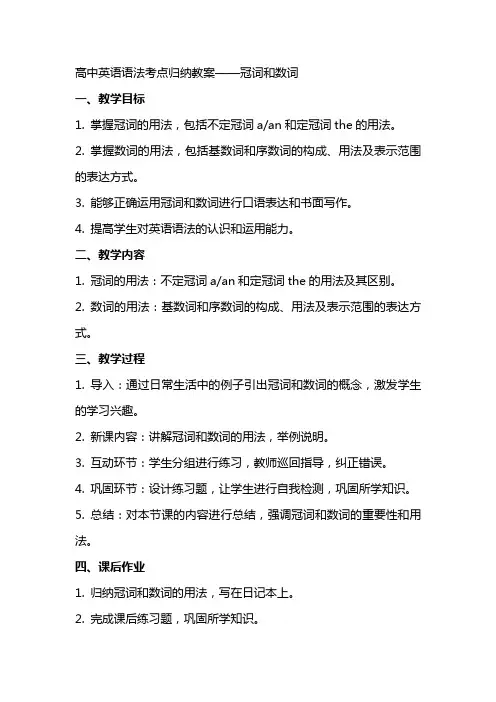
高中英语语法考点归纳教案——冠词和数词一、教学目标1. 掌握冠词的用法,包括不定冠词a/an和定冠词the的用法。
2. 掌握数词的用法,包括基数词和序数词的构成、用法及表示范围的表达方式。
3. 能够正确运用冠词和数词进行口语表达和书面写作。
4. 提高学生对英语语法的认识和运用能力。
二、教学内容1. 冠词的用法:不定冠词a/an和定冠词the的用法及其区别。
2. 数词的用法:基数词和序数词的构成、用法及表示范围的表达方式。
三、教学过程1. 导入:通过日常生活中的例子引出冠词和数词的概念,激发学生的学习兴趣。
2. 新课内容:讲解冠词和数词的用法,举例说明。
3. 互动环节:学生分组进行练习,教师巡回指导,纠正错误。
4. 巩固环节:设计练习题,让学生进行自我检测,巩固所学知识。
5. 总结:对本节课的内容进行总结,强调冠词和数词的重要性和用法。
四、课后作业1. 归纳冠词和数词的用法,写在日记本上。
2. 完成课后练习题,巩固所学知识。
五、教学评价1. 课后收集学生的日记本,检查他们对冠词和数词用法的归纳。
2. 在下一节课开始时,对学生进行测试,了解他们对冠词和数词的掌握情况。
3. 根据学生的表现,给予适当的表扬和鼓励,提高他们的学习积极性。
六、教学策略1. 采用情境教学法,通过设置真实的语境,让学生在实践中学习和运用冠词和数词。
2. 运用任务型教学法,设计各种任务,让学生在完成任务的过程中,自然地使用冠词和数词。
3. 采用分组合作学习,增加学生之间的互动,提高学生的参与度。
七、教学资源1. 教学PPT:包含冠词和数词的用法讲解、例句、练习题等。
2. 实物教具:如图片、卡片等,用于辅助教学。
3. 练习题:包括选择题、填空题、翻译题等,用于巩固所学知识。
八、教学步骤1. 复习导入:通过复习上节课的内容,引出本节课的主题——冠词和数词。
2. 讲解冠词和数词的用法:分别讲解不定冠词a/an和定冠词the的用法,以及基数词和序数词的构成、用法。
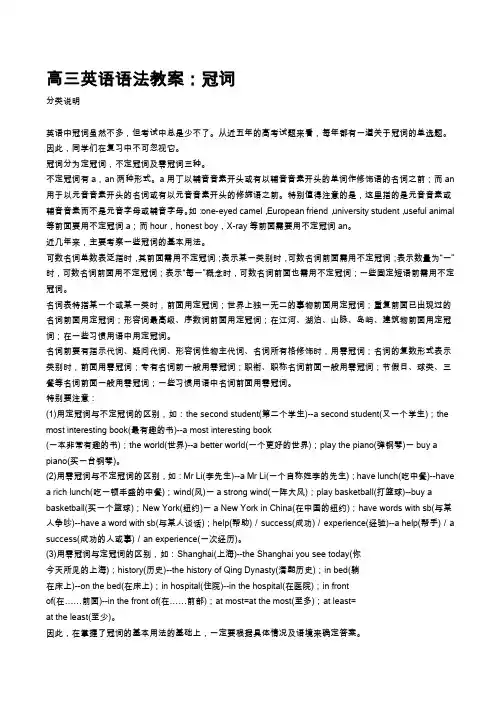
高三英语语法教案:冠词分类说明英语中冠词虽然不多,但考试中总是少不了。
从近五年的高考试题来看,每年都有一道关于冠词的单选题。
因此,同学们在复习中不可忽视它。
冠词分为定冠词,不定冠词及零冠词三种。
不定冠词有a,an两种形式。
a用丁以辅音音素开头或有以辅音音素开头的单词作修饰语的名词之前;而an 用于以元音音素开头的名词或有以元音音素开头的修旆语之前。
特别值得注意的是,这里指的是元音音素或辅音音素而不是元音字母或辅音字母。
如:one-eyed camel,European friend,university student,useful animal 等前面要用不定冠词a;而hour,honest boy,X-ray等前面需要用不定冠词an。
近几年来,主要考察一些冠词的基本用法。
可数名词单数表泛指时,其前面需用不定冠词;表示某一类别时,可数名词前面需用不定冠词;表示数量为“一”时,可数名词前面用不定冠词;表示“每一”概念时,可数名词前面也需用不定冠词;一些固定短语前需用不定冠词。
名词表特指某一个或某一类时,前面用定冠词;世界上独一无二的事物前面用定冠词;重复前面已出现过的名词前面用定冠词;形容词最高级、序数词前面用定冠词;在江河、湖泊、山脉、岛屿、建筑物前面用定冠词;在一些习惯用语中用定冠词。
名词前要有指示代词、疑问代词、形容词性物主代词、名词所有格修饰时,用零冠词;名词的复数形式表示类别时,前面用零冠词;专有名词前一般用零冠词;职衔、职称名词前面一般用零冠词;节假日、球类、三餐等名词前面一般用零冠词;一些习惯用语中名词前面用零冠词。
特别要注意:(1)用定冠词与不定冠词的区别,如:the second student(第二个学生)--a second student(又一个学生);the most interesting book(最有趣的书)--a most interesting book(一本非常有趣的书);the world(世界)--a better world(一个更好的世界);play the piano(弹钢琴)一buy a piano(买一台钢琴)。
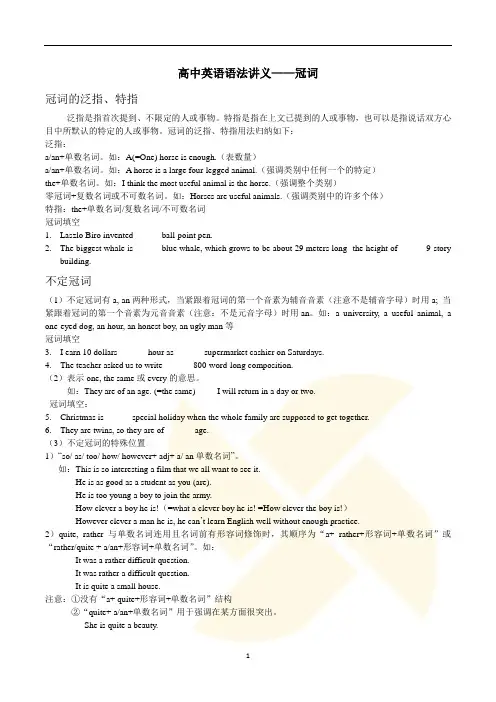
高中英语语法讲义——冠词冠词的泛指、特指泛指是指首次提到、不限定的人或事物。
特指是指在上文已提到的人或事物,也可以是指说话双方心目中所默认的特定的人或事物。
冠词的泛指、特指用法归纳如下:泛指:a/an+单数名词。
如:A(=One) horse is enough.(表数量)a/an+单数名词。
如:A horse is a large four-legged animal.(强调类别中任何一个的特定)the+单数名词。
如:I think the most useful animal is the horse.(强调整个类别)零冠词+复数名词或不可数名词。
如:Horses are useful animals.(强调类别中的许多个体)特指:the+单数名词/复数名词/不可数名词冠词填空szlo Biro invented______ ball-point pen.2.The biggest whale is______ blue whale, which grows to be about 29 meters long- the height of______ 9-storybuilding.不定冠词(1)不定冠词有a, an两种形式,当紧跟着冠词的第一个音素为辅音音素(注意不是辅音字母)时用a; 当紧跟着冠词的第一个音素为元音音素(注意:不是元音字母)时用an。
如:a university, a useful animal, a one-eyed dog, an hour, an honest boy, an ugly man等冠词填空3. I earn 10 dollars ______ hour as ______ supermarket cashier on Saturdays.4. The teacher asked us to write ______ 800-word-long composition.(2)表示one, the same或every的意思。
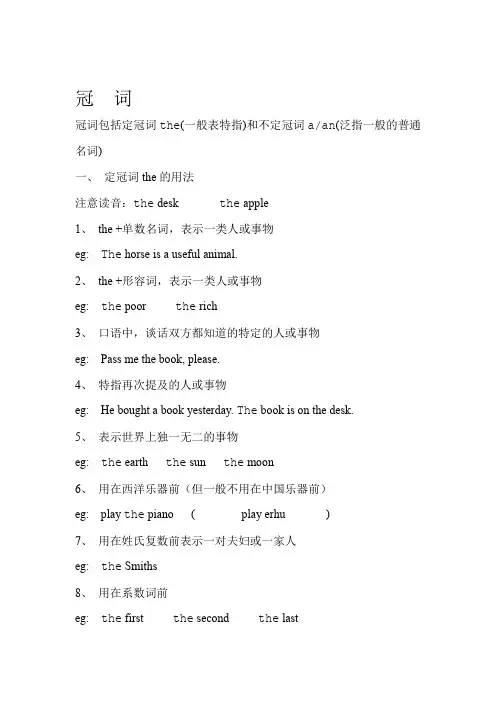
冠词冠词包括定冠词the(一般表特指)和不定冠词a/an(泛指一般的普通名词)一、定冠词the的用法注意读音:the desk the apple1、the +单数名词,表示一类人或事物eg: The horse is a useful animal.2、the +形容词,表示一类人或事物eg: the poor the rich3、口语中,谈话双方都知道的特定的人或事物eg: Pass me the book, please.4、特指再次提及的人或事物eg: He bought a book yesterday. The book is on the desk.5、表示世界上独一无二的事物eg: the earth the sun the moon6、用在西洋乐器前(但一般不用在中国乐器前)eg: play the piano ( play erhu )7、用在姓氏复数前表示一对夫妇或一家人eg: the Smiths8、用在系数词前eg: the first the second the last9、用在形容词或副词的最高级前eg: the oldest the fastest the coldest注意区分下面两句话:most beautiful.the It'sIt's most(very) beautiful.另外当两个形容词或副词的最高级并列修饰同一名词时,后一个最高级前the可省略He is the tallest and (the) fastest in our class.10、用在方位词和某些表示时间的词组或习惯用语前eg: on the left/right in the east in the middle ofin the end in the morning/afternoon/eveningin the daytime on the other hand11、表示在世纪的某个年代eg: in the 1990's in the 1870s12、用在表示单位的名词前eg: by the hour/day/week/month/yearby the yard(码)/foot(英尺)Eggs are sold by the dozen.(注意比较:Eggs are sold by weight.)13、在某些专有名词前eg: the Summer Palace the Red Seathe New York Times the Bible14、用在表示身体部位的名词前eg: He gave me a pat(拍) on the shoulder.二、不定冠词a/an的用法注意使用:a bag an applean hour a useful box an unusual day1、a/an + 单数名词,表示一类人或事物) animal.狡猾的fox is a cunning(A eg:2、表示一个人或事物,起介绍作用eg: He is a doctor.3、说明事物的同一性质、特征、程度或大小= the sameeg: The two shirts are of a size.Birds of a feather flock together.4、用在表示时间或度量单位的名词前,具有“每一”的意思= per eg: 60 miles an hour 1000 yuan a month5、用于人名前,表示说话人对此人不认识,也可以表示与某一名人有类似性质的人或事物eg: A Mr. Smith(一个叫史密斯先生的人)came to see you this morning.He is a LeiFeng in our class.He wishes to become a Newton.三、零冠词的使用1、复数名词表示一类人或事物eg: Cows are useful animals.2、在表示人名、地名、国名、季节、月份、星期几以及节日的名词前eg: Tom Fujian China Spring May Sunday National Day但以festival表达的节日则要使用冠词eg: the Spring Festival3、一日三餐及球类前eg: have breakfast play basketball4、表示学科、棋类、颜色和感官名词前eg: maths play chess White is a beautiful colour.Smell is one of the five senses.称呼语或表示身份、职位、头衔的名词前、5.eg: Good morning, boys and girls. Where is Dad, Mum?Uncle Wang President Lincoln6、物质名词和抽象名词前eg: Desks are made of wood. Failure is the mother of success.7、与by连用的表示交通工具的名词前eg: by bike by bus by sea/land/air但如果换成其它表达就要使用冠词eg: in a boat on the bus take a taxi8、名词前有名词所有格、形容词性物主代词、指示代词、疑问词以及某些形容词(some/ any/ many/ much / little/ a little/few/ a few / each/ every/ either/ another/ both/ all/ no等)作定语时eg: Whose purse is this?9、以and连接的两个相对的名词并用时eg: day and night pen and ink husband and wife father and son master and servant(仆人) heart and soul brother and sister 10、某些介词连接的两个相对的名词时也不用冠词eg: face to face hand in hand step by step side by sidefrom top to bottom from beginning to end11、用as引导的让步状语从句,作为表语的名词提前且为单数时使用零冠词eg: Child as he is, he can answer this question.四、使用冠词与不使用冠词的差异eg: in hospital住院/in the hospital在医院at school/at the school in church作礼拜/in the church by sea乘船/by the sea未来/in the future从今以后in future in front of/in the front ofout of question毫无疑问;没问题/out of the question不可能五、使用定冠词与使用不定冠词的差异eg: the most important meeting /a most important meetingthe third time第三次/a third time第三次+又(再)一次in the distance在远处/at a distance稍远一些for the moment目前;暂时/for a moment一会儿a number of许多/the number of………的数量六、两个或多个名词并列使用时的差异两个或多个名词并列使用时,若指一个人或事物,则在第一个名词前加冠词,若指两个或多个不同的人或事物,则每个名词前都要加冠词。
高三英语教案:《冠词备考复习》教学设计【重难点突破】[概述] 冠词是虚词,不能单独使用,位于名词前,帮忙指明名词的含义。
(一)、不定冠词a和an的用法基本用法(1)、用在单数可数名词前,表示某一类人或事物中的个体。
A teacher shouldnt talk like that.老师不应当这样讲话。
(2)、用于表示首次提到的某人或某物,但没有详细说明是谁或是什么。
(短文改错中常出现)(3)、用来表示"一'的概念,但不如one的数字概念强。
It took me a year to save up for a new coat.我用了一年时间才省出钱买一件新外套。
特别用法(1)、表示价钱、时间、速度等的"每一'(=per)。
---- Its said John will be in a job paying over $60,000 ______ year.---- Right, he will also get paid by ______ week.(____江西卷)A.the; theB.a; theC.the; aD.a; a(2)、在专出名词前表示"某一个'、"相似的一个'。
The visitors here are greatly impressed by the fact that ________ people from all walks of life are working hard for ________ new Jiangsu. [____?江苏]A./; aB./; theC.the; aD.the; theExperts think that ______recently discovered painting may be ______ Picasso.(____浙江卷)A.the ;不填B.a ;theC.a; 不填D.the; a(3)、用于序数词前表示"又一'、"再一'。
冠词【考点定位】考纲解读和近几年考点分布冠词是历年高考的必考知识点,常出现在单项选择、语法填空(语篇)和短文改错中。
虽说只有两类,共三个(不定冠词a, an和定冠词the),但其使用规则很复杂,一直是让考生感到很头痛的一类命题。
需要说明的是:在近年高考试题中,冠词主要是在语法填空的语篇中进行考查。
但从整套试题来看,在短文改错、书面表达、阅读理解等题型中对冠词的隐性考查可谓无处不在。
在日常交际中,几乎每说一句话、每写一篇日记、每读一篇文章都会涉及到冠词的运用。
因而不论高考的考查形式如何变化,冠词仍应是高考复习的重点知识。
纵观历年高考试题,冠词考点主要集中在以下内容:1.考查不定冠词a ,an表示个别或泛指的用法;2.考查定冠词the特指某一个人或事物的用法;3.考查不定冠词和定冠词在固定搭配中的用法;4.考查零冠词(即省略冠词)表示泛指及其习惯搭配用法;5.考查冠词在表示类别名词前的用法;6.考查不定冠词在具体化抽象名词前的用法;7.考查冠词在比较级前的用法;8. 考查冠词在其他特殊结构中的用法。
【高考命题预测】冠词是高考中的高频考点,主要考查冠词在具体语境中的正确使用为主。
预测今后考点分布在对不定冠词的考查;定冠词的考查;不用冠词的情况以及一些固定词组中冠词的正确使用。
从高考命题来看,冠词考点常以单项填空、语法填空(语篇)和短文改错的形式出现,它可能把冠词的各种用法结合名词一起进行考查。
建议在复习时:1.掌握冠词的基本用法;2.掌握冠词的习惯用法;3.在解答试题时,要从翻译的角度去做,如果能够准确地翻译出句子的意思,就能够解答此题。
【复习建议】1. 根据知识网络将冠词的基本用法记牢,这是你做好试题的前提。
2. 熟悉一些名词的用法,和冠词结合。
有很多不可数名词,有时候被具体化的情况,也是考查的重点。
3. 多做练习,能够提高熟悉语境的能力,很多考题是要和语境相联系起来考查的,这方面一定要重视。
【冠词练题】The driver was at ___ loss when ____word came that he was forbidden to drive for speeding.A. a; /B. a; theC. the; theD. /; /【解析】考查冠词。
冠词复习教案范文教案标题:冠词复习教学目标:1.复习英语中的冠词用法;2.提高学生对冠词的识别能力;3.培养学生正确运用冠词的能力。
教学重点:1.复习英语中的冠词用法;2.提高学生对冠词的识别能力。
教学难点:1.学习并正确运用不同种类的冠词;2.理解冠词在句子中的作用。
教学准备:1.幻灯片投影仪;2.打印或复印相关教材或练习题。
教学过程:步骤一:导入(5分钟)1.引导学生回忆冠词的定义和作用。
2.出示一些图片,请学生根据图片描述物品,并用适当的冠词来描述。
1. 解释不定冠词(a/an)的用法:a. 用于表示泛指的单数名词,如:I see a book.b. 用于表示职业或国籍,如:She is a doctor. He is an American.2. 解释定冠词(the)的用法:a. 用于特指的名词,如:I see the book on the table.b. 用于特指前已提到的名词,如:I have a book. The book is on the table.c. 用于乐器、报纸、海洋、山脉等特指名词前,如:I can play the piano. He reads the newspaper every day. They climbed the Mount Everest.d. 用于宇宙学、娱乐业、学科等固定搭配中,如:The sun rises in the east. She is studying the history of art.3.解释零冠词的用法:a. 用于一般真理,如:Water boils at 100 degrees Celsius.b. 用于表示一类事物,如:Dogs are loyal animals.步骤三:练习与应用(20分钟)1.让学生完成相关的练习题,以巩固冠词的用法。
2.设计一些情境,让学生运用冠词进行对话或书写句子。
1.给学生提供更多的练习题,让他们进一步巩固所学内容。
高中英语语法考点归纳教案——冠词和数词一、教学目标:1. 让学生掌握冠词的用法,包括不定冠词a/an和定冠词the的用法。
2. 让学生掌握数词的用法,包括基数词和序数词的构成、用法及表达方式。
3. 培养学生运用冠词和数词进行口语交流和书写能力。
二、教学内容:1. 冠词的用法:不定冠词a/an和定冠词the的用法。
2. 数词的用法:基数词和序数词的构成、用法及表达方式。
三、教学重点与难点:1. 教学重点:冠词和数词的用法。
2. 教学难点:不定冠词和定冠词的用法,以及数词在不同情境下的表达方式。
四、教学方法:1. 采用任务型教学法,让学生在实际语境中运用冠词和数词。
2. 运用多媒体教学手段,为学生提供丰富的视觉和听觉材料。
3. 组织小组讨论,激发学生的学习兴趣和主动性。
五、教学步骤:1. 引入:通过图片和实物,引导学生关注冠词和数词在日常生活中的应用。
2. 讲解:讲解不定冠词a/an和定冠词the的用法,以及基数词和序数词的构成、用法及表达方式。
3. 练习:设计不同情境的练习题,让学生运用所学知识进行口语交流和书写。
4. 拓展:介绍冠词和数词在不同语境下的特殊用法,如固定搭配、习惯表达等。
5. 总结:对本节课的内容进行归纳总结,强调重点和难点。
6. 作业布置:设计课后作业,巩固所学知识。
7. 课后反思:对本节课的教学效果进行评价和反思,为下一步教学做好准备。
六、教学评价:1. 采用形成性评价和终结性评价相结合的方式,关注学生在学习过程中的进步和成果。
2. 评价内容包括:冠词和数词的用法、口语交流和书写能力。
3. 评价方法:课堂观察、练习完成情况、课后作业、小组讨论等。
七、教学资源:1. 教材:高中英语课本及相关辅导资料。
2. 多媒体课件:图片、视频、音频等。
3. 实物:日常用品、图片等。
4. 练习题:各类练习题及答案。
八、教学进度安排:1. 课时:2课时。
2. 教学内容:冠词和数词的用法。
3. 教学过程:引入、讲解、练习、拓展、总结、作业布置。
高中英语语法考点归纳教案——冠词和数词一、教学目标1. 知识目标(1) 掌握不定冠词a和an的用法。
(2) 掌握定冠词the的用法。
(3) 掌握零冠词的用法。
(4) 掌握数词的分类及用法,包括基数词和序数词。
2. 能力目标(1) 能够正确运用不定冠词和定冠词表达名词。
(2) 能够运用数词表达数量和顺序。
3. 情感目标(1) 培养学生的语法意识,提高学习英语的兴趣。
(2) 培养学生合作学习的能力,提高课堂参与度。
二、教学重难点1. 教学重点(1) 不定冠词a和an的用法。
(2) 定冠词the的用法。
(3) 零冠词的用法。
(4) 数词的分类及用法,包括基数词和序数词。
2. 教学难点(1) 不定冠词和定冠词在特定语境中的运用。
(2) 数词的用法,尤其是序数词的运用。
三、教学方法1. 采用任务型教学法,让学生在实践中学习冠词和数词的用法。
2. 运用小组合作学习,提高学生的参与度和积极性。
3. 运用多媒体教学手段,丰富教学内容,提高学生的学习兴趣。
四、教学过程1. 导入:通过日常生活场景,引导学生思考冠词和数词的重要性。
2. 教学新课:讲解不定冠词a和an、定冠词the以及零冠词的用法。
3. 实践环节:让学生运用所学知识进行小组讨论,举例说明冠词和数词的用法。
4. 课堂练习:设计相关练习题,巩固所学知识。
五、课后作业1. 完成课后练习题,巩固冠词和数词的用法。
2. 结合所学知识,编写一个短文,运用冠词和数词表达具体情境。
六、教学评价1. 评价方式(1) 课堂表现:观察学生在课堂上的参与程度、发言积极性和合作意识。
(2) 课后作业:检查学生完成作业的质量,巩固所学知识。
(3) 单元测试:进行单元测试,测试学生对冠词和数词的掌握程度。
2. 评价内容(1) 冠词和数词的用法。
(2) 学生在实际语境中运用冠词和数词的能力。
七、教学反思教师在课后应对本节课的教学效果进行反思,分析教学过程中的优点和不足,以便在今后的教学中进行调整和改进。
冠词的用法概述【知识要点】冠词是一种虚词,无词义,也没有数和格的变化,不能独立使用,常常放在名词前,帮助说明这个名词的意义。
复习冠词须把握好以下三个原则:其一:单数可数名词用不定冠词a/an表示泛指;其二:复数可数名词及不可数名词表示泛指时,其前不加冠词;其三:无论可数名词还是不可数名词,表示特指其前都要加定冠词the。
一、不定冠词的用法1.不定冠词表示数量“一”,与one相近。
如:I will finish this work in a day.我一天就要完成这项工作。
2.不定冠词用在首次提到的人或物之前,表示泛指。
如:There is a park on the corner of the street.在这条街的拐角处有个公园。
3.不定冠词用在单数可数名词前,表示一类人或事物。
如:A teacher must love his students.教师必须热爱学生。
4.不定冠词表示单位,有“每一”之意。
如:This cloth is 5 yuan a meter 这种布料5元一米。
5.不定冠词用在物质名词、抽象名词之前,表示“一阵,异常,一种……”等等,也可以表示引起某种情绪的事,即抽象名词具体化使用。
如:Honesty is a virtue. 诚实是一种美德。
It’s a pity that you missed this chance.你错过这次机会是件很遗憾的事。
6.不定冠词用在人名前,表示说话者对此人不认识,相当于a certain,也可以指与某人名有类似性质的人或物。
如:A Mr Wang came to see you this morning.今天早上一位王先生来找过你。
7.用在有名词中的地名前,表示“一个……样的地方”。
如:8.用在带有修饰词的、表示三餐饭的名词之前,表示“一顿……的午(晚)饭”等。
如:He likes to have a quick breakfast. 他喜欢吃快早餐。
高中英语语法复习学案教师版——冠词★Underline the articles in the following sentences and tell the usages of them1. The (特指) famous sports star, who is also a (一个) great success in business, is in possession of a (一笔) huge fortune.2. As is reported, the (普通名词构成的专有名词前) CPI went up mainly because of an (元音音素前,表“一”) 18.2% rise in food prices.(一) 不定冠词的用法1. 【填冠词】a university a one-eyed dog a European caran hour an X-ray an ugly man an honor【总结】不定冠词有a; an 两种形式,当紧跟着冠词的第一个音素为元音(不是元音字母)时用an当紧跟着冠词的第一个音素为辅音(不是辅音字母)时用a【题组训练】1. I earn 10 dollars an hour as a supermarket casher on Saturday.2. The teacher asked us to write an 800- word – long composition.2. 【用英语解释冠词的用法】1) They are an age. ( = the same)2) I will return in a day or two. ( = one)3) Hi, John. A Mr. Smith is waiting for you outside. ( = a certain)【题组训练】1. There’s a dictionary on the desk by your side.2. I know a John Lemon, but not the one you know.3. They are twins, so they are of an age.3. 【填冠词】1) My work experience and education background have supplied me with many skills and an understanding of dealing with the teenagers.2) He has a fine collection of paintings.3) A knowledge of a foreign language is necessary.4) You need X specialized knowledge to do this job.【总结】有些由动词转化而来的不可数名词,如果后面有of, 在这些名词前需要加上a 或an,即抽象名词的具体化4. 【短语】have a cold have a good time have a gift for have a word with …in a hurry once in a whileat a loss for a while once upon a time all of a sudden at a distance have a population ofa waste of …have / take a rest have a holiday get a lift / ride go on a diet a matter of …【题组训练】 1. I don’t want to have words with you. I prefer to have a word with you.2. X W(w)ord came that the president would inspect them.【特殊位置】1. What an interesting book I have read! = How interesting a book I have read!what / such / half … + a / an + 可数名词单数2. This dress is twice as expensive as that one. = This is twice as expensive a dress as that one.so / as / too / how / however + adj. + a / an + 可数名词单数3. That was a quite extraordinary experience. = That was quite an extraordinary experience.quite / rather + a / an (+ adj.) + 可数名词单数(二) 定冠词的用法1. 【观察】1) The Greens are at table. 2) The Chens are going to move to Langfang.【总结】用在姓氏复数前表示一家人或者夫妇2. 【观察】the Tang Dynasty the Spring and Autumn Period in the 1990s【总结】用在朝代、年代名词前和逢十的数词(表示某个年代)前3. 【观察】1) I have hired the car by the hour. 2) Eggs are sold by the dozen.【总结】用在表量度单位的名词前,表示“每一”【题组训练】 1. The diet is measured in X calories, while the food is sold by the pound.2. The cost of this product is calculated by X weight.4. 【填介词】take sb. by the arm hit sb. in the face strike sb. on the back【总结】句型:动词+ sb. + 介词+ the + 身体部位5. 【短语】make the most / best of in the daytime in the end in the habit of in the distance in the wayon the whole on the right / left at the same time on the one hand … on the other hand at the moment go to the cinema / theatre go to the doctor’s the other day for the time being on the radio / phone on the spot to tell you the truth by the way to the public6. 【观察】How do you like the film?【总结】在特指的人或物前,表示“这/ 那”7. 【观察】This is my room, the room is bright and clean.【总结】用在前面提到过的人或物的前面,或者与其相关的事物前8. 【观察】Please remember to take the medicine.【总结】用在双方都知道的人或物前9. 【观察】the sun; the moon; the sky【总结】用在世界上独一无二的事物及自然现象前10. 【观察】The car goes faster than the bike.【总结】定冠词可以用来表示类指11. 【观察】The first girl is his younger sister.【总结】定冠词可以用在序数词前12. 【观察】This is the best book I have read.【总结】定冠词可以用在形容词和副词的最高级前13. 【观察】He is the taller of the two boys.【总结】定冠词可以用在形容词的比较级前,表示“两者中较……的”14. 【观察】the young; the living; the dead【总结】定冠词用在形容词、动词-ing、或者动词过去分词前,表示一类人、一类事或一类活动15. 【观察】The milk on the table is her. This is the place where I once lived.【总结】定冠词可以用在被修饰性的名词短语或从句前16. 【观察】the police; the family【总结】定冠词可以用在集体名词或可数名词复数前,表示整体17. 【观察】Bell invented the telephone in 1861.【总结】在表示发明的单数可数名词前用定冠词18. 【观察】play the piano; play the violin【总结】表示乐器的名词前要用定冠词19. 【观察】in the south of French【总结】方位名词前用定冠词20. 【观察】the Changjiang Rive; the South Sea; Mount Qilian; Taiwan Island; Lake Michigan【总结】在江、河、海、山脉、群岛、沙漠等专有名词前用定冠词;而山峰、岛屿、湖泊前用零冠词21. 【观察】the barber’s (shop); the tailor’s (shop)【总结】在表示公共团体、公共建筑和店铺的名词前要用零冠词22. 【观察】in the rain; in a heavy rain【总结】在表示自然现象的名词前要用定冠词;但是如果名词前有形容词修饰的话,要用零冠词23. 【观察】the more, the better【总结】“the + 形容词比较级,the + 形容词比较级”意思是“越……越……”24. 【观察】the Christians; the Americans; the working class【总结】“the + 某些名词”表示民族、阶层等25. 【观察】exactly the same color; just the right place; half the story; double the amount【总结】在名词词组中,定冠词一般放在最前面;但是词组中有exactly; just; half; double; twice; all; both 等修饰词的话,定冠词应该放在这些词后面(三) 零冠词的用法1. 【观察】1) Father went to his doctor for advice about his heart trouble.2) Horses are useful animals.【总结】不可数名词、复数名词表泛指,用零冠词【题组训练】1) He likes to talk on the phone while I prefer writing X letters.2) Water is changed into X steam by heat and into X ice by cold.3) The W(w)ater in the well is sweet.2. 【口诀】月、季、星期、节假、洲;呼语、头衔、职务前;三餐、球类、惯用语;学科、棋类名词前【题组训练】1) X A(a)utumn is the harvest season.2) The organization was founded in the spring of 2010.3. 【观察】1) Has he turned scientist? 2) When did he become a scientist?【总结】系动词turn (变成)后的单数名词做表语,用零冠词4. 【句型转换】1) Although he is a hero, he has some shortcomings.Hero as / though he is, he has some shortcomings.2) Though he is a young man, he has seen much of the world.Young man as / though he is, he as seen much of the world.【总结】as 表示“尽管”时,做表语的单数名词放在句首,省略冠词a / an5. 【特殊用法】翻译:老师进来了,手里拿着一本书。